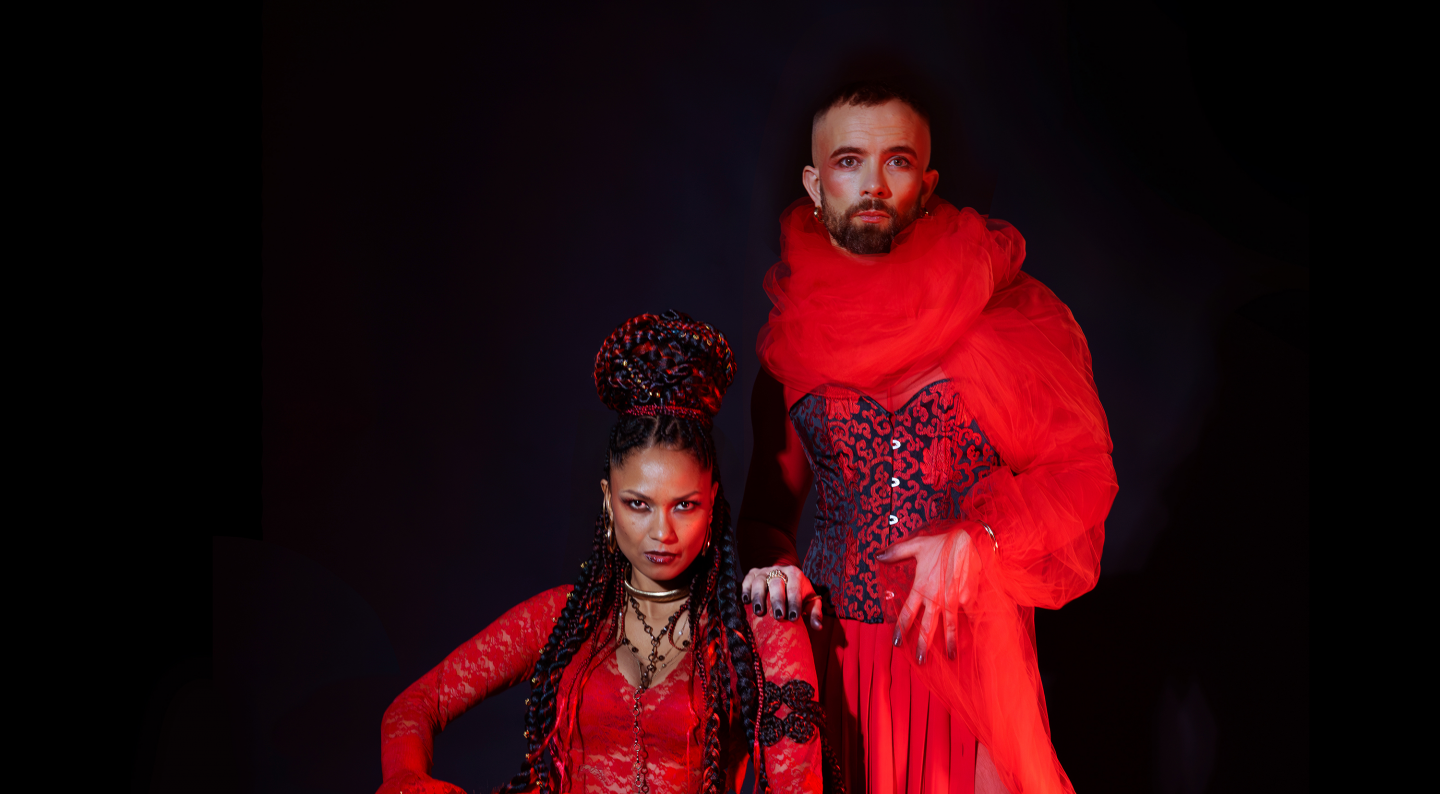Olof Dreijer and Diva Cruz have expanded their personal and musical boundaries through an enduring musical partnership and now present their debut EP together 'Brujas' on Dekmantel
- a chest of steamy, drum-driven tracks that meld samba, salsa and Brazilian funk grooves with razor-sharp production and searing vocals underpinned by a provocative political message.
Olof Dreijer is best known as one-half of the lauded Swedish group The Knife. He’s been pushing the limits of electronic music for over two decades. Recently he’s moved away from releasing music under monikers with three EPs under his real name; output that showcases his daring synth-lines, global influences and depth as a producer.
The musical talents of Colombian-Swedish percussionist Diva Cruz have taken her around the world - notably as lead percussionist for Robyn’s world tour, Fever Ray and all-female salsa band Orquesta D’Caché. As a DJ, Cruz often incorporates live percussion into her sets - enriching them with Latin American rhythm and lustre.
At the heart of their collaboration are the timbales, shallow metal-encased percussive drums - descendants of the kettle drum that evolved in Cuba in the late 19th century - now brought firmly into the present moment by this multi-dimensional duo.
We caught up with Diva and Olof to talk about their fiery new single ‘Brujas’ released on 5th of July via all major platforms and their upcoming live performance at Dekmantel 10 on Sunday, 4th of August 2024.
Words: Heather King
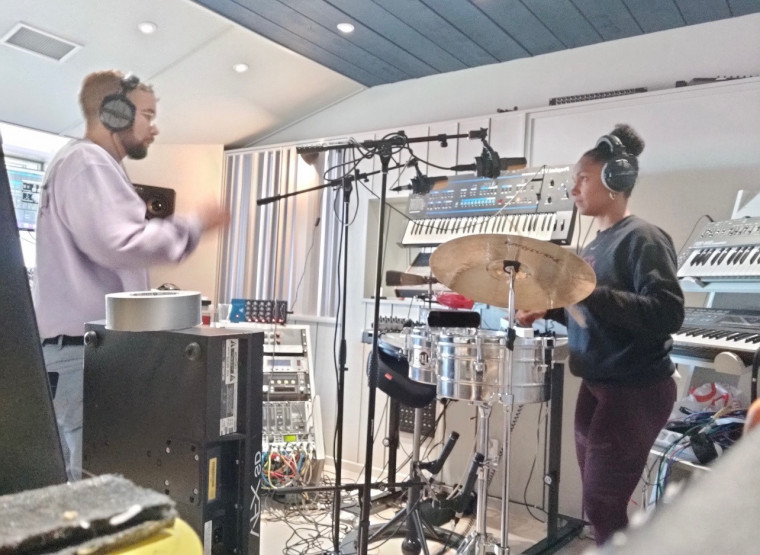
Let’s rewind right to the beginning. How did this project come into being?
Diva: There is a lot of music from South America that is hugely popular, but when I listen to the lyrics, they make me sad and upset. I thought to myself, “Do people really understand the lyrics?”, because a lot of the lyrics disrespect and degrade women. My lived experience in Sweden and growing up in Colombia has given me a unique perspective and I felt that I had a lot of things to say - I really wanted to talk about these issues and inspire change.
I started writing about these issues when I was touring with Robyn. I was really inspired by her and started writing my first lyrics on the tour bus during the world tour. It was like therapy for me. I felt better after I started writing. Another major change that inspired me to write and start singing was the pandemic. I thought “What are we as musicians going to do?”, so I started doing vocal training during that time. On one hand you have the writing and on the other hand you have the vocal expression - these two elements came from different periods in my life.
I met Olof when I was working with his sister Karin - drumming for Fever Ray. He was producing for the group too. I approached him about the possibility of creating music together. I was really honoured and happy to work with Olof because he gave me a lot of inspiration and trusted my ideas. He was very supportive and the collaboration has been really fun. I felt the freedom to express all the things I wanted to say for the first time. I felt safe in the creative space with him. It was an easy process to work together - easy and fun.
"I felt the freedom to express all the things I wanted to say for the first time. I felt safe in the creative space with him. It was an easy process to work together - easy and fun." - Diva Cruz
The vocal aspect of the project represents something completely new for you Diva, as well as challenging what could be called a dominant ideology in certain genres and territories. What other boundaries do you feel that you have pushed through the project, if any?
Olof: For every little creative choice we made, we tried to make the music in a way that we haven’t heard before. It’s everything from how the drums are played, how they are mic’d on the very technical level and also how we hear Diva’s voice. For example, when Diva comes to me with a lyric, my role as a producer is how to communicate the content of the lyrics in a sonic way: how her voice sounds, the expression and who Diva is as a character in the music. Her vocals aren’t treated or filtered, but we put a lot of work into how they sound in rehearsals and during recording.
When we are on stage, we try to break the separation between the DJ and the percussionist in our roles. I’m not so good at rapping - so I don’t do that, but I do sing and we both switch between the role of the DJ and the drummer at various points in the show. We try to play around with how things are normally done - just to have fun. We have spent a lot of time rehearsing for the live shows. We have built a great foundation and we will continue to develop the performance. We do make changes on the day, but all in all - it is very intentional and planned.
I saw some photos of a recent performance alongside the words “playing together” and I thought that might work on a few different levels - your costumes, for example, feel quite playful.
Diva: Yes, while we were making the tracks and rehearsing, we did some role-playing and took on different imagined characters which made the process really fun. It really improved our communication. We put a lot of love and energy into the creative process.
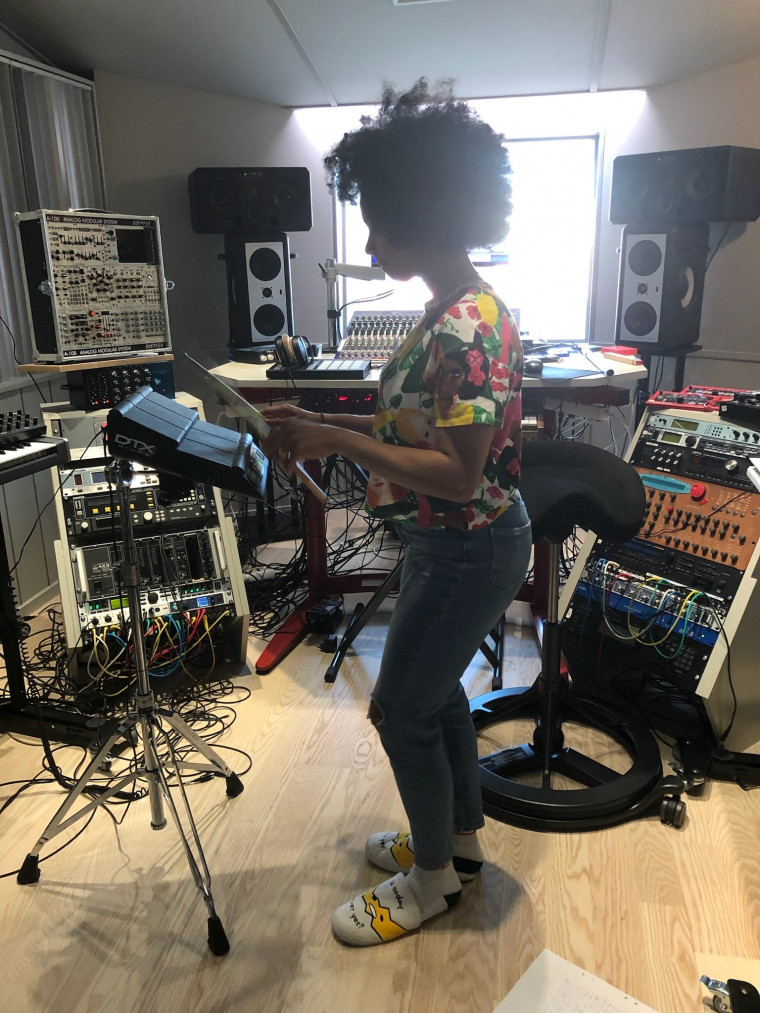
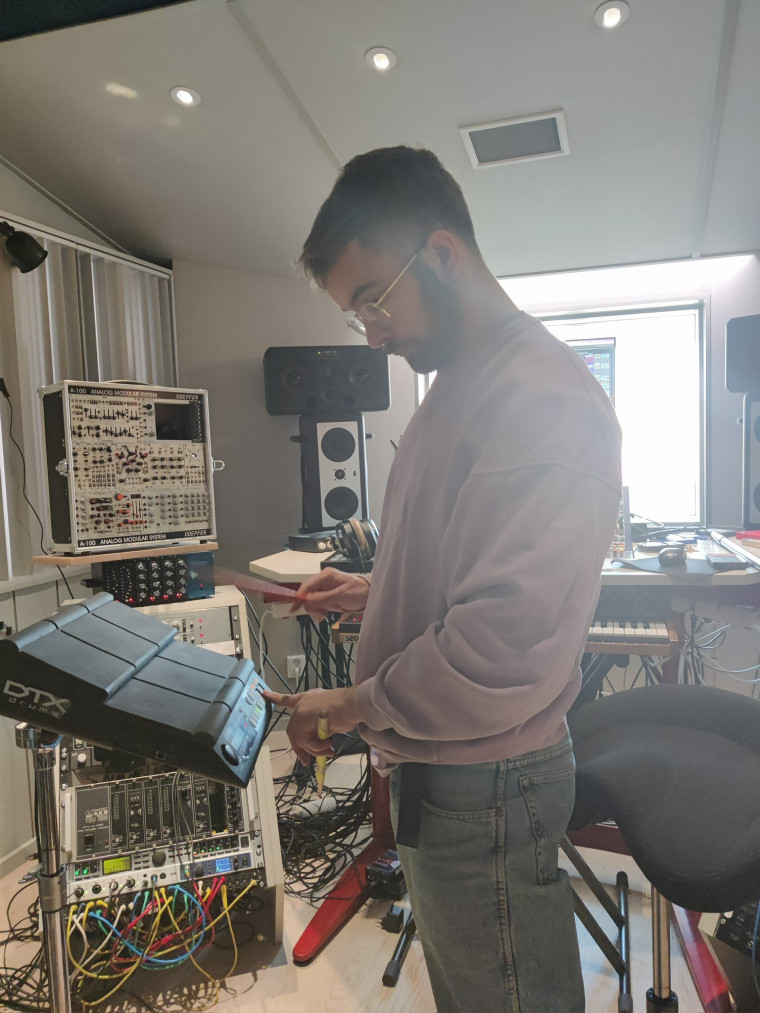
Tell me about your creative process, the practical aspects of the collaboration...
Olof: We both live in Stockholm, and as Diva explained, she came to me with an idea to make vocal tracks for the first time. Singing and rapping were not things that she had done before. In the beginning, I took on the producer role, but later in the process we decided it might be more strategic to include my name too because I have a platform and we could play the tracks when I am booked as a DJ. That’s the route we took and we produced the live show together.
We have been working on these tracks for a few years. How the tracks sound has been changing and evolving a lot. Usually we record Diva’s vocals and then we make beats with the timbales and then we add synthesiser on top. It’s all recorded as it is performed so there is a lot of live percussion.
Diva wanted to create a Spanish take on Brazilian funk and I have a lot of respect for Brazilian funk so we tried to do our own take on it as much as possible. We tried to combine the samba, the salsa and the funk groove - they are all very different, but we tried to move between these grooves.
We have Diva singing and rapping for the first time and at the same time Olof is producing Latin American forms of music for the first time. You’ve both been learning and expanding your personal repertoires with this project…
Olof: Yes, we have tried a lot of new things! The samba groove is new for both of us and we have been learning that together. I have played percussion live before but I have never really been putting myself out there. I’ve always been more in the background, so to speak. So this project represents a lot of new things.
Diva: Yes, for me it’s the same for the vocals. I’ve done chorus and backing vocals and have always played drums in the background but this is the first time I’ve been right in front of the audience, centre stage.
"I have played percussion live before but I have never really been putting myself out there. I’ve always been more in the background, so to speak. So this project represents a lot of new things." - Olof Dreijer
The title track off the single ‘Brujas’ means witches. What was the idea behind that track and the core political message of the EP?
Diva: It’s a personal message. I wanted to talk about problems that are not only faced by women but any gender - that together we can work to do better. All this violence against women and these things that we cannot decide about our bodies. I believe that all of these social problems are linked. I’m really interested in these social problems and I really wanted to put these ideas into music. Music has the power to spread ideas and inspire change. Some people may say this is too heavy, but these are the things that we are living right now. These are problems that women are facing all over the world. I want to use music to inspire awareness and discussion about these issues. I want to create hope and I want people to feel that we can work together and do better. I want people to feel empowered and happy, but at the same time become more conscious about how we are living. I think this is really important. I think that as an artist it is important to play this part in society - not simply talk about superficial things. Society has become so plastic - I think we need to be more conscious of what we are facing in real time.
It feels like a full circle moment for you, Diva. I believe that you studied psychology and have a degree in Medical Science and that your thesis focussed on how to incorporate music into Public Health efforts in the school system..
Diva: Yes, that’s right. For many years I’ve felt very frustrated because I feel so strongly about these issues but felt powerless. I wanted to take a stand. This project was a way for me to express myself, finally! It’s been a great journey. I feel so grateful to Olof for his support.
Olof: I am grateful, I have learned so much.
Talk me through your approach on a technical level..
Olof: It’s been really exciting to use the timables in the way you’d create techno or dance music. We played a lot with loops instead of the traditional samba format. In the live shows there is a lot of percussion which is more traditional - so there is an interesting interplay between the traditional samba and salsa forms, but we have combined them with less traditional elements. We don’t use crazy effects - we use fairly traditional techno sounds like bass drum, synthesiser with the salsa timbales on top.
When you want to communicate an important political message - which are the lyrics that Diva has written - then it needs to feel warm and inviting somehow. This isn’t something that we have spoken about before. Our emotion and intention is behind the message and now we are trying to articulate the creative choices behind the music itself. For the same reasons, that’s why we play percussion during the DJ sets - we feel that the DJ set might be a bit cold and impersonal. We want to create an inclusive and warm environment that welcomes everyone - an environment that everyone from our mothers to a cool teenager will enjoy.
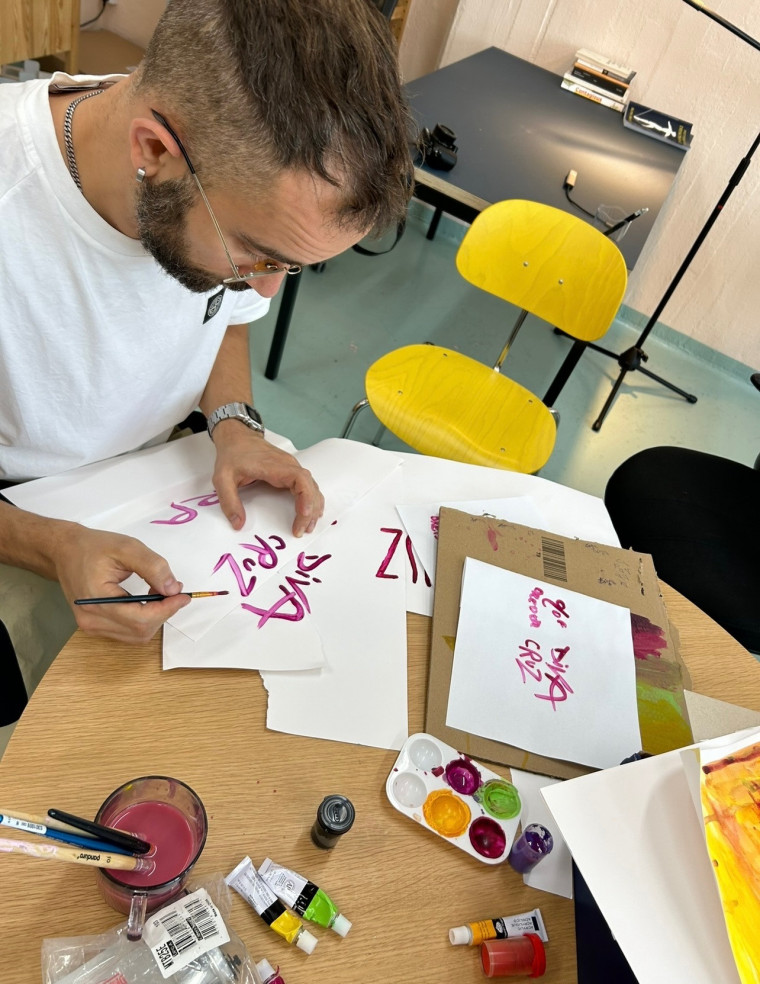
All of the creative choices you have made - from the vibrant drums to the bright colours on the EP artwork and not taking the music to experimental extremes have been deliberate - a mechanism to take the political message to the biggest audience possible?
Olof and Diva: Exactly.
Tell me about the relationship with Dekmantel as a label - how did you land up signing your single to the label?
Olof: I played my first DJ set at Dekmantel last year on the Radar stage and I stayed in contact with the label. They heard the new material and they loved it and wanted to release it - so it’s been a great platform and a really natural fit. We are so excited about bringing the music and the message to the Dekmantel audience.
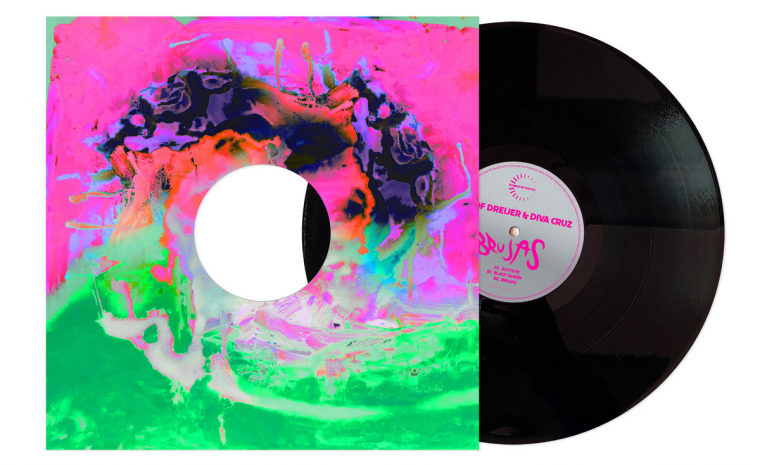
What does the rest of 2024 look like for you?
Olof: We have a festival summer ahead of us, with. We have shows around Europe in August, including a performance of the new single at Dekmantel Festival on Sunday, 4th of August. Then next year we have more shows lined-up and we’re both working on more music which we’re looking to release next year.
